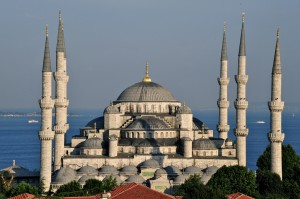
This is the last part of a series, discussing the pros and cons of an accession of Turkey to the European Union from all angles. Find the other parts here: First / Second / Third
In the third part of the series, I argued why Turkey should not become a member of the EU from the EU’s perspective. In this paper I focus on the argument from Turkey’s perspective. Basically the main arguments on “why Turkey should not become a member of the EU” are based on the cultural differences, corrupted European community, economic and political challenges within the EU.
Cultural differences

As known the main argument against Turkey’s membership is based on the fact that Turkey has a big Muslim population while the EU’s member states have the reverse situation. In this case Turkey should not become a member of the EU because it has a historical symbol in the Islamic world. In the era of the Ottoman Empire, one of the largest and biggest empires in the world, the Sultans (1) were caliphates (2) at the same time. This difference based on religion is one of the double-standards applied by the Europeans against Turkey. For example, although there is no too big a difference between a Turk and a Greek, Greece is a member but Turkey is not. Their life styles, cuisines, cultures, and so on are very similar to each other but the only difference between them is based on religions within the societies: While a big part of Turkish population is Muslim, a big part of Greek population is Christian. From this point of view religion plays an important role for membership.
Also the argument in the eye of the Europeans that Turkey does not respect minorities is not true because when you visit Istanbul, an impressive city in the world, you can see mosque, church and synagogue together. This has been the same for many centuries all over Turkey but you cannot see this in many European states. There are still many European states that do not allow the European Muslims to establish their own mosques.
Thus, Turkey has its own history and background, so if it becomes a member, it can lose its socio-historical values.
Europe as a corrupted community
Today, the European youth is on the verge of “death”. They do not care about their lives. They consume a lot of alcohol every day. Annoyance, rape, violation, consumption of drug, and atheism are the situations seen very often in the European states. Thus, if Turkey becomes a member, these negative situations can spread to the Turkish society.
Economic challenges
At the beginning of the 2000s, economic crises and corruptions were seen very often in Turkey. However, by the ruling government, the Turkish economy has been developing itself in a more positive way. Today, some EU member states have very critical economic challenges. For example, if we look at current economic data, Greece, Malta, Portugal, Spain and some others have economic crisis, so their economic challenges can affect the Turkish economy in a negative way.
Also, the rate of unemployment has been rising in Europe, so by becoming a member of the EU, the rate of unemployment in Turkey can rise.
Thus, we can deduce that the argument that “If Turkey becomes a member, the Turkish workers would invade the Europe” is completely wrong. In fact, the European workers may invade the Turkish economy.
Political challenges
The EU has a complex institutional structure. The Commission, Council, Parliament, Central Bank and many other institutions work unlike the institutional structure of Turkey. Also, most of the political decisions within the EU are taken in supranational or inter-governmental negotiations. Unfortunately, the institutional structure of Turkey is not ready for such a position.
Another important issue related to the argument above is based on the difficulty of applying the common policies of the EU to the Turkish politics. Especially the common foreign policy, common security policy and common monetary policy are always in the agenda. Because of this, when Turkey becomes a member, it has to share those common policies with other members.
Thus, if Turkey becomes a member of the EU, it has to share the EU’s institutional and political structures.
As a conclusion, cultural differences between Turkey and the EU, the possible effects of the corrupted European community, economic possibilities and some political challenges indicate that Turkey should not become a member of the EU.
Endnotes
- The word coming from Arabic language “Sultan” is the Emperor of the Ottoman Empire. They are the highest rulers that are the members of the Ottoman dynasty.
- The word coming from Arabic language “Caliphate” is a form of political-religious leadership which centres on the caliph to the prophet Muhammad, the final prophet that was sent for the whole humanity by the almighty the Allah. The position of a caliphate can be seen as the position of the Pope in the Catholic world.
About the author:
 Hacı Mehmet Boyraz (21) is a student of International Relations with Political Science and Public Administration at Gediz University in İzmir.
Hacı Mehmet Boyraz (21) is a student of International Relations with Political Science and Public Administration at Gediz University in İzmir.

